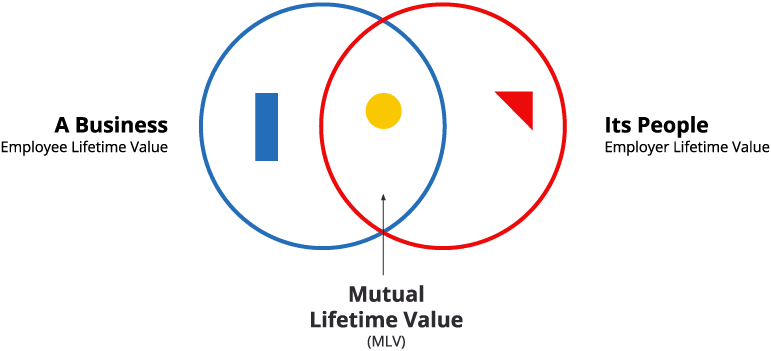We believe that there has to be a balance between the value an employee brings to an organisation, and the value an employer provides its workforce.
Tip too far one way and people feel undervalued, disengaged and into “quiet quitting” territory.
Too far the other way and the organisation may struggle to be profitable, efficient or have a good culture.
There has to be balance. It has to be mutual. We call this Mutual Lifetime Value.

Why calculate Mutual Lifetime Value?
Not everything needs to get measured. But with 90% of UK employees disengaged, the scales have slipped too far. Each disengaged employee costs an average of 34% of their salary per year, or £11,890 for the median UK salary, making it a race to the bottom.
“What gets measured, gets managed.” The quote might have its critics, but this is one metric that is too important to ignore.
How can we calculate Mutual Lifetime Value?
There are three key metrics:
- Employee Lifetime Value
- Employer Lifetime Value
- Mutual Lifetime Value
How to calculate Employee Lifetime Value
Employee Lifetime Value is an established metric, based on customer lifetime value, a formula long used in marketing. Employee lifetime value works out how much value a
Average ELTV = (average yearly revenue / total number of employees) * average length of an employee’s tenure in years
So why not flip the equation to work out the Employer Lifetime Value?
How to calculate Employer Lifetime Value
Taking the same structure, you could calculate Employer Lifetime Value as:
Average ERTV = Yearly pay & benefits / total number of employees * average length of tenure
As far as we can tell, no-one is talking about Employer Lifetime Value. A Google search will return you to us, a couple of typos (if you read carefully, they’re talking about Employee Lifetime Value) and one website in Chinese.
As a concept this is brand new. Is it useful? We’re not sure yet, but our gut says yes.
How to calculate Mutual Lifetime Value
Ah, the million dollar question. We’ll be honest with you, we’re testing it now. All we can say is it’s a relationship between Employee and Employer lifetime value, but we need to validate our idea. That’s what 2024 is all about for us, testing.
We also have a couple of other formulas up our sleeve. We’re not giving too much away just yet, but suffice to say that we believe an employee lifecycle begins before they apply for a job, and doesn’t end when they leave the building for the last time….
Want to measure your Mutual Lifetime Value?
If being a pioneer in Employee Experience appeals to you, why not measure your own Mutual Lifetime Value?
Together, we can make a better working world for everybody.
